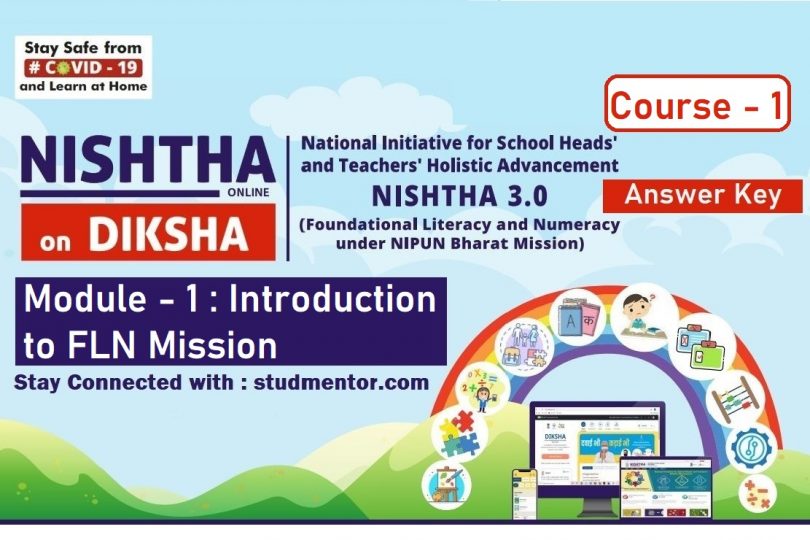Nishtha 3.0 FLN Diksha Portal Module 1 Introduction to FLN Mission
1. The Basic aim of the _____________ is to enable all children to read and respond with comprehension, independently write with understanding, understand the reasoning in the domains of number, measurement and shapes, and become independent in problem-solving by way of Numeracy spatial understanding skills.
Answer :- National mission on Foundational Literacy and Numeracy
2. NCERT, as a leading academic institution in the country, has to play an important role in attaining ___________goals by developing material and conducting training for teacher and teacher educators.
Answer : Foundational literacy and numeracy
3. Early years are ‘critical’ in any child’s life span since the ___________is more rapid than at any other stage of developement.
Answer : Rate of development
4. In the government, ECCE is mainly provided through Integrated Child Development Services(ICDS) centres known as ….
Answer : – Anganwadis
5. The planning and implementation of ECCE curriculum will be carried out _____by the MoE, Women and child Development (WCD), Health and Family Welfare (HFW), and Tribal Affairs
Answer :- Jointly
6. Pre-school education ensures a ______from preschool to early primary classes leading to better performance and better retention rates.
Answer :- Smooth transition
7. The vision of the mission is that every child achieves the desired learning competencies in reading, writing and numeracy at the end of ______
Answer :- Class III and not later than Class V
8. FLN Mission is a national initiative for proficiency in _________
Answer : – Reading with understanding and numeracy
9. The mid-day meal programme will also be extended to the Preparatory Classes in primary schools as per NEP 2020. Here Preparatory Class means _______
Answer : – Class before Class I
10. Efforts will be made to ___government primary school teachers and develop material like e-content , including lesson plans, use of innovative pedagogies, etc. to support teachers teaching at the primary level.
Answer : – Mentor
11. Schools will work for the attainment of _______in a mission mode according to FLN Mission guidelines.
Answer : – Foundational Literacy and Numeracy skills
12. In NEP 2020 it is envisaged that prior to the age of five every child will move to a ‘Preparatory Class’ or Balvatika, which has an ECCE-qualified teacher. Balvatika is a _________
Answer : – Class before Class I
13. NCERT will be providing _________to states and UTs in the fulfilment of FLN Mission objectives
Answer : – Academic support
14. Focus of foundational learning is ___________
Answer : – On holistic development of the child
15. ECCE in our country is delivered through _______institutions, consisting of (a) stand-alone anganwadis; (b) anganwadis co-located with primary schools; (c) pre-primary schools/sections covering at least age five to six located with existing primary schools; and (d) stand -alone pre-schools as mentioned in NEP 2020.
Answer : -Early childhood education
16. Who has provided the guidelines of FLN Mission?
Answer : – MoE
17. Which one of the following is not the role of volunteers to achieve FLN targets?
Answer : -Framing policy for FLN Mission
18. The national FLN Mission is an important step towards ensuring that by ________, our children attain skills of reading with meaning and basic mathematical and numeracy skill
Answer : – Class III
19. Attaining FLN for all children must become an immediate national ___
Answer : – Mission
20. The vision of the FLN Mission is to create an enabling environment in all aspects to ensure_____in primary classes by 2025 so that evert child achieves the desired learning competencies in reading, writing
Answer :- Universal acquisition of FLN
Second Attempt
- NEP has set a deadline of ____to achieve FLN.
Answer : – 2025
2. In the new 5+3+3+4 structure proposed by NEP 2020, a strong base of ___from age three is included, which is aimed at promoting better overall learning, development, and well-being.
Answer :- ECCE
3. The Department of School Education will provide —- to teachers in the achievement of learning outcome, quality for student engagement, retention and academic achievement for classes I to V.
Answer : – Academic support
4. The vision of the mission is that every child achieves the desired learning competencies in reading, writing and numeracy at the end of ______
Answer :- Class III and not later than Class V
5. The mid-day meal programme will also be extended to the Preparatory Classes in primary schools as per NEP 2020. Here Preparatory Class means _______
Answer : – Class before Class I
6. The Basic aim of the _____________ is to enable all children to read and respond with comprehension, independently write with understanding, understand the reasoning in the domains of number, measurement and shapes, and become independent in problem-solving by way of Numeracy spatial understanding skills.
Answer :- National mission on Foundational Literacy and Numeracy\
7. The full form of ECCE is
Answer : – Early Childhood Care and Education
I Hope you like the article of the Nishtha 3.0 FLN Diksha Portal Module 1 Introduction to FLN Mission Quiz Answer Key, If you like then share to Others,
If any doubt regarding the Answer then Leave comments. we will revert back to you.
Happy Reading, Stay Connected


Very good Information